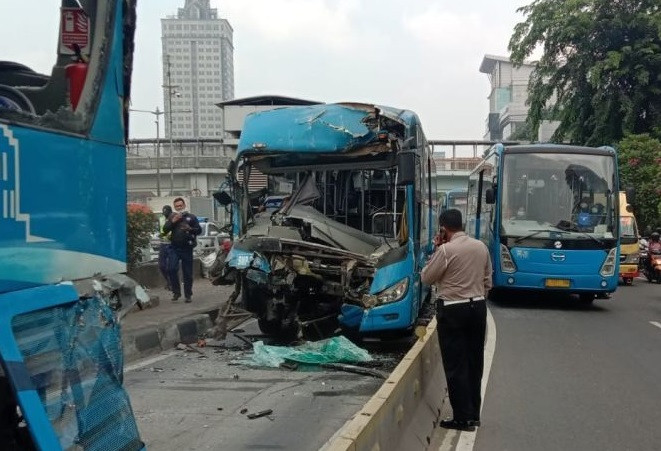Popular Reads
Top Results
Can't find what you're looking for?
View all search resultsPopular Reads
Top Results
Can't find what you're looking for?
View all search resultsTransjakarta’s reforms
Transjakarta president director Mochammad Yana Aditya said the company would overhaul its system in accordance with the KNKT’s recommendations to prevent further accidents in the future.
Change text size
Gift Premium Articles
to Anyone
T
he Jakarta-owned bus service Transjakarta has taken several tough measures after three of its buses crashed within a single day on Dec. 6, 2021. The fact that the company recorded at least 502 accidents involving its fleet from January to October of that year, however, speaks volumes about its need to immediately address safety standards, or else it will lose the confidence of the traveling public.
Apart from its pledge to heed the recommendations from the National Transportation Safety Committee (KNKT), which conducted an investigation shortly after the triple accidents, Transjakarta temporarily suspended the operation of certain types of buses belonging to two of its six partners, PT Steady Safe and PT Mayasari Bakti. Jakarta Governor Anies Baswedan also dismissed Transjakarta operations director Prasetio Budi following the crashes, although city government officials said the replacement had nothing to do with the series of accidents.
Transjakarta president director Mochammad Yana Aditya said the company would overhaul its system in accordance with the KNKT’s recommendations to prevent further accidents in the future. The move will start with talks between Transjakarta and its six partners to improve standard operating procedures for all bus drivers.
In fact, the KNKT suggested that Transjakarta establish a separate office specifically responsible for setting and maintaining safety standards. The new unit, an expansion of the existing one, should also create more adaptive and dynamic work mechanisms that ensure the roadworthiness of vehicles and skills of drivers.
The KNKT also asked the company to map road hazards along all Transjakarta routes, including on toll roads, given a number of risks it found along 13 rapid transit corridors allocated for the buses, which span 251.2 kilometers – perhaps the longest in the world.
Had such drastic reforms been initiated much earlier, Transjakarta could have prevented the many accidents, some of which were fatal. Nevertheless, the company needs to change overtime procedures given the new challenges it will always face, such as the pandemic, to remain as a reliable bus rapid transit system for the city of 11 million population.
Since its maiden operation in 2004, Transjakarta has seen a steady increase in ridership rates. Before the pandemic struck in March 2020, the Transjakarta fleet served 1 million passengers a day. With the city moving closer to a seamless and integrated public transportation system, the ridership rate will continue to increase.
Despite its shortcomings, Transjakarta has introduced a new culture of commuting. Ranging from the use of e-payments to priority seats for the elderly, pregnant women and people with disabilities, the services Transjakarta provides rival those in advanced countries.
Improving safety standards, however, remains an uphill challenge that the company can address if it walks the talk of all its reform promises following the spate of accidents. One of the expected changes should be a single wage system for drivers.
Drivers of Transjakarta-owned buses are paid based on their work hours, at rates higher than those of their peers working for the company’s partners, which follow distance-based payment. This gap has forced the latter to take part-time jobs after their work hours, at the expense of their health and alertness.
Another possible reform is for Transjakarta to relinquish its role as an operator and focus on its responsibility as the regulator in order to keep the safety bar high.











